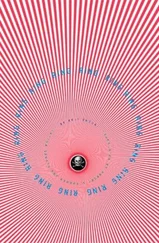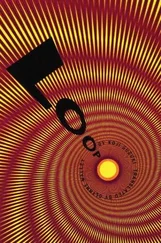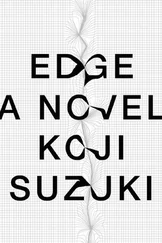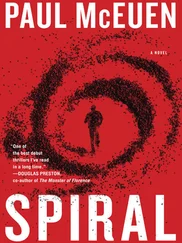Kojo Suzuki - Spiral
Здесь есть возможность читать онлайн «Kojo Suzuki - Spiral» — ознакомительный отрывок электронной книги совершенно бесплатно, а после прочтения отрывка купить полную версию. В некоторых случаях можно слушать аудио, скачать через торрент в формате fb2 и присутствует краткое содержание. Год выпуска: 2007, ISBN: 2007, Издательство: Harper, Жанр: Ужасы и Мистика, на английском языке. Описание произведения, (предисловие) а так же отзывы посетителей доступны на портале библиотеки ЛибКат.
- Название:Spiral
- Автор:
- Издательство:Harper
- Жанр:
- Год:2007
- ISBN:9780007240142
- Рейтинг книги:4 / 5. Голосов: 1
-
Избранное:Добавить в избранное
- Отзывы:
-
Ваша оценка:
- 80
- 1
- 2
- 3
- 4
- 5
Spiral: краткое содержание, описание и аннотация
Предлагаем к чтению аннотацию, описание, краткое содержание или предисловие (зависит от того, что написал сам автор книги «Spiral»). Если вы не нашли необходимую информацию о книге — напишите в комментариях, мы постараемся отыскать её.
Spiral — читать онлайн ознакомительный отрывок
Ниже представлен текст книги, разбитый по страницам. Система сохранения места последней прочитанной страницы, позволяет с удобством читать онлайн бесплатно книгу «Spiral», без необходимости каждый раз заново искать на чём Вы остановились. Поставьте закладку, и сможете в любой момент перейти на страницу, на которой закончили чтение.
Интервал:
Закладка:
Mai hadn’t ever understood the difference between genes and DNA. Weren’t they just the same thing? Ryuji had set about explaining to her that DNA was the chemical material on which hereditary information was recorded, while a gene was one unit of that nearly infinite amount of hereditary information. In the course of the discussion, he’d mentioned that the technology existed to break DNA down into small segments using restriction enzymes, and to rearrange it. Mai had commented that the process sounded “like a puzzle”. Ryuji had agreed: “Absolutely, it’s like solving a puzzle, or deciphering a code.” From there, the talk had digressed, until Ryuji was telling her a story from his college days.
When Ryuji had learned that the nitty-gritty of DNA technology involved code-breaking, he’d started to play cipher games with his friends in med school, between classes. He told her an interesting anecdote about these games. Many of the students were fascinated by molecular biology, and so, before long, Ryuji had recruited about ten guys to play with. The rules were simple. One person would submit a coded message, and then everybody else would have a certain number of days in which to decipher it. The first one to get it right won. The game tested their math and logic skills, but also required flashes of inspiration. The guys loved it.
The codes varied in difficulty, depending on the skill of the person devising them, but Ryuji had been able to solve most of them. Meanwhile, only one classmate had ever been able to crack any of Ryuji’s codes. Mitsuo Ando. Ryuji told Mai how shocked he’d been when Ando had broken his code.
I got chills. It was like he’d read my mind.
And so the name Mitsuo Ando had made a deep impression on Mai.
Which was why she’d been so astonished when the detective had introduced her to Ando at the M.E.’s office. He had to be the Ando-he’d even introduced himself as an old friend of Ryuji’s. Knowing Ando had been the only one to ever unlock one of Ryuji’s codes, Mai had felt she could trust him. She just knew his skills with the scalpel had to be way up there, and that he’d easily figure out the cause of death.
Mai was still under the sway of the words of a man who’d been dead for two weeks. If Ryuji hadn’t mentioned Ando to her, she probably never would have been able to call the M.E.’s office to ask about the cause of death; she never would have ended up seeing Ando again on campus. She certainly never would have made plans to have dinner with him. One chance word from Ryuji had subtly bound her.
Mai turned off the main road into a maze of residential streets. There she spotted a convenience store sign that she recognized. She knew where to go from there. Once she turned at the convenience store, Ryuji’s parents’ house would be straight ahead. As two-week-old memories started to come back to her, she quickened her step.
It was a nondescript house, built on a parcel of about four hundred square yards. From the wake, she remembered that the first floor contained a largish living room adjoined to a smaller Japanese-style room.
No sooner had Mai rung the doorbell than Ryuji’s mother appeared at the door. She’d been waiting impatiently for Mai, and showed her up to the second floor, to the room Ryuji had studied in from grade school on through his sophomore year at college. After his junior year, Ryuji had moved out of the house, even though it was well within commuting distance, and taken a room near campus. The only times the room had been used as a study since were when Ryuji had come home to visit.
Ryuji’s mother set down a plate of shortcake and a cup of coffee and left the room. As Mai watched her shuffle down the hall, head drooping, she was touched by the woman’s grief at losing her son.
Left alone, Mai took her first good look around the room. It was a Japanese-style room with a matted floor. In one corner a carpet had been spread out under a desk. Bookshelves lined the walls, but she could only see their upper portions; the lower shelves were hidden by the confusion of cardboard boxes and appliances that littered the floor. She took a quick count of the boxes. Twenty-seven. These held everything that had been carted over from Ryuji’s East Nakano apartment after his death. The larger furniture-the bed, the desk, etc.-they’d given away. The boxes seemed to contain mostly books.
Mai sighed, then seated herself on the floor and had a sip of coffee. She was already trying to resign herself to the possibility that she wouldn’t be able to find it. Even if it were in there somewhere, it’d be quite a task to find a few manuscript pages among all those things. Perhaps the pages weren’t even in those boxes.
The twenty-seven boxes were all sealed with tape. She took off her cardigan, rolled up her sleeves, and opened the nearest one. Paperbacks. She picked up a few. One turned out to be a book she’d given him as a present. Longing washed over her. The smell of Ryuji’s old apartment clung to the cover.
This is no place to let yourself wallow in emotion.
She choked back her tears and went back to work taking things out of the box.
But when she got to the bottom, there was still no sign of the pages. Mai tried to deduce what they could have gotten mixed in with. Maybe one of the books he’d been using as a reference, or one of the files in which he’d kept his research materials. She kept breaking the seals on the boxes.
Her back started to break into a sweat. Taking books out of boxes and putting them back in was surprisingly strenuous work. After she’d finished her third box, she took a breather and entertained the idea of filling in the missing pages by herself. Ryuji’s challenging theory of symbolic logic had already been made public, albeit in piecemeal form, in specialist journals. The project at hand, however, wasn’t quite so esoteric. Ryuji had also been writing a book-length study aimed at the general reader that dealt with logic and science in the context of various social problems. What he was saying in it wasn’t too difficult. In fact, the work was being serialized in a monthly put out by a major publisher. Mai had been involved from the start, when she’d volunteered to make clean manuscript copies of what Ryuji wrote; she’d even attended meetings with his editor. As a result, she felt she had a good handle on the flow of Ryuji’s argument as well as on his writing style. If one or two pages were all that was missing, she felt confident she could come up with something to fill in the gap without creating any inconsistencies.
But that’s only if I could be sure only one page is missing.
If that were the case, she’d probably give in to the temptation. Each installment had averaged forty manuscript pages, but that was only an average. They’d ranged from thirty-seven to forty-three. This was the twelfth and last installment, and she had no idea how many pages Ryuji had actually ended up with. That meant she had no way of knowing how many were missing. When she’d slipped out of the wake to put the manuscript in order, she’d found the installment, thirty-eight handwritten pages. The final page was numbered thirty-eight, and there were thirty-seven pages preceding it. So she had no inkling at first that anything was amiss. What with the funeral and all, she was late in sitting down to make a clean copy, and the deadline was upon her when she finally sat down and read through it. It was then that she realized that there was a lacuna between the last two pages. In terms of page numbers, they looked okay-thirty-seven was followed by thirty-eight-but something important was missing. In fact, the conclusion. And without it the argument made no sense. The last two lines of page thirty-seven had been crossed out in ballpoint pen, with an arrow leading to the edge of the page. But the next page did not contain the head of that arrow. She could only surmise that he must have added something and that that something had disappeared.
Читать дальшеИнтервал:
Закладка:
Похожие книги на «Spiral»
Представляем Вашему вниманию похожие книги на «Spiral» списком для выбора. Мы отобрали схожую по названию и смыслу литературу в надежде предоставить читателям больше вариантов отыскать новые, интересные, ещё непрочитанные произведения.
Обсуждение, отзывы о книге «Spiral» и просто собственные мнения читателей. Оставьте ваши комментарии, напишите, что Вы думаете о произведении, его смысле или главных героях. Укажите что конкретно понравилось, а что нет, и почему Вы так считаете.












